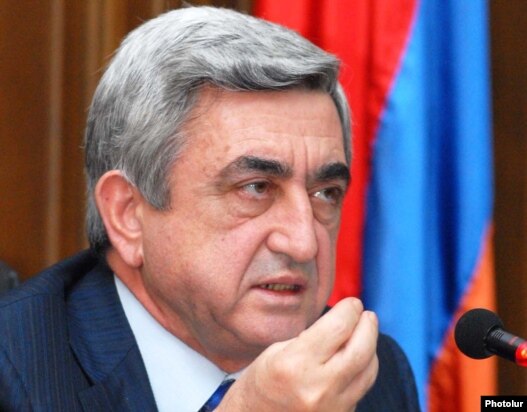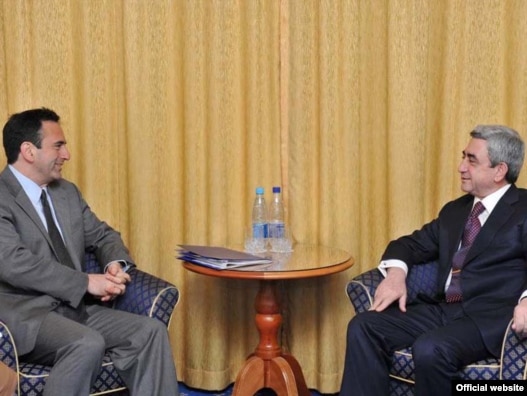 Armenia — Foreign Minister Edward Nalbandian at a news conference on March 2, 2010.
Armenia — Foreign Minister Edward Nalbandian at a news conference on March 2, 2010.
Official Yerevan dismissed on Tuesday Turkish warnings that a U.S. congressional resolution describing the 1915 massacres of Armenians in the Ottoman Empire as genocide would set back the normalization of Turkish-Armenian relations. (UPDATED)
The Foreign Affairs Committee of the U.S. House of Representatives is scheduled to discuss and vote on the proposed legislation on Thursday. It urges President Barack Obama to “accurately characterize the systematic and deliberate annihilation of 1,500,000 Armenians as genocide.”
The Turkish Foreign Ministry warned on Monday that its approval by the House committee would harm not only U.S.-Turkish relations but also efforts by Turkey and Armenia to normalize bilateral ties. “We would like to believe that the members of the committee are aware of the damage… the endorsement of the resolution will bring and, in this context, act responsibly,” the ministry said in a statement.
Turkish Prime Minister Recep Tayyip Erdogan reportedly issued a similar warning over the weekend. He said passage of the genocide resolution to would bring the U.S.-backed Turkish-Armenian reconciliation process to a halt.
Armenian Foreign Minister Edward Nalbandian brushed aside the warning, saying that the biggest threat to that process emanates from Ankara’s “preconditions” for the implementation of the Turkish-Armenian normalization agreements which were set by Ankara months before the House panel scheduled a debate on the resolution.
“It is statements made in Turkey and the return to the language of preconditions that deal a blow to the process of normalizing Turkish-Armenian relations,” Nalbandian told a news conference. “We hope that Turkey will rid itself of artificial complexes created by the Turkish side and that we will be able to move forward in accordance with our understandings.”
Nalbandian stopped short of explicitly urging U.S. lawmakers to recognize what many historians consider the first genocide of the 20th century. But in a sign of Yerevan’s tacit support for the resolution, four members of Armenia’s parliament will fly to Washington on Wednesday at the invitation of Frank Pallone and Mark Kirk, the two U.S. lawmakers co-chairing the congressional Caucus on Armenian Issues. The bipartisan group, currently numbering 150 House members, has long been pushing for Armenian genocide recognition.
An official in the National Assembly told RFE/RL’s Armenian service that Pallone and Kirk asked their Armenian colleagues to “present their views on and approaches to issues of mutual interest” to U.S. legislators and foreign policy-makers. The genocide resolution will be the main focus of their meetings in Washington, said the official.
A similar delegation of Turkish parliamentarians is already in Washington, meeting with U.S. officials and lobbying against the resolution. “My impression is that the (Obama) administration is not fighting against it very effectively,” one of them, Sukru Elekdag, said on Monday, according to Reuters.
Obama has so far declined to openly endorse or, as past U.S. administrations did, oppose the measure. The Associated Press cited aides to senior Democratic and Republican lawmakers on the House Foreign Affairs Committee as saying last week there has been no pressure against the resolution from the White House yet. According to a spokesman for the pro-Armenian committee chairman, Howard Berman, the Obama administration was informed about Thursday’s vote ahead of time.
Obama repeatedly pledged to recognize the Armenian genocide when he ran for president, earning the overwhelming backing of the Armenian Americans. However, he has refrained from using the word “genocide” since taking office, implicitly citing the need not to undermine the Turkish-Armenian rapprochement.
“His view of that history has not changed,” US National Security Council spokesman Mike Hammer said last week. “Our interest remains the achievement of a full, frank, and just acknowledgement of the facts.”
“The best way to advance that goal is for the Armenian and Turkish people to address the facts of the past as a part of their ongoing efforts to normalize relations,” said Hammer. “We will continue to support these efforts vigorously in the months ahead.”
Some observers have speculated that Washington is using the prospect of U.S. recognition of the genocide to try to get the Turks to ratify the two Turkish-Armenian protocols signed in October. The Turkish ambassador to the United States, Namik Tan, seemed to give weight to this view on Saturday.
“The greatest lobbyist in Washington is the administration,” Tan said, according to the Associated Press. “We have not seen them around enough on this.”
Still, Erdogan expressed confidence on Tuesday that Obama will display “common sense” on the matter. Speaking before parliament deputies from his Justice and Development Party, he said he conveyed the Turkish concerns to U.S. Secretary of State Hillary Clinton at their recent talks in Qatar.
“I separately discussed with her what would be the cost of an adverse result from that,” “Hurriyet Daily News” quoted the Turkish premier as saying. “I am calling on everyone once more to act with common sense. I’d like to say it would be more accurate to research genocide claims not at the House of Representatives but at universities and archives.”





 Armenia — President Serzh Sarkisian addresses the parliament’s Audit Chamber on January 22, 2010.
Armenia — President Serzh Sarkisian addresses the parliament’s Audit Chamber on January 22, 2010.


 Armenia — President Serzh Sarkisian (R) meets with U.S. Assistant Secretary of State Philip Gordon in Kiev on February 25, 2010.
Armenia — President Serzh Sarkisian (R) meets with U.S. Assistant Secretary of State Philip Gordon in Kiev on February 25, 2010.